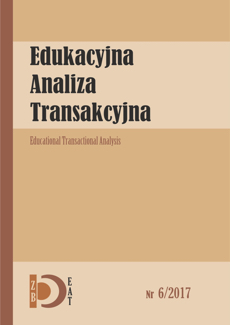Formal and Informal Use of TA Counselling in Education
- Authors
-
-
Piotr Jusik, mgr
International Community School w Londynie, Centro de Investigacion Cientifica y Cultural w San Pedro, Guatemala
-
- Keywords:
- consuelling, formal and informal consuelling, consuelling roles
- Abstract
-
This article applies role theory and thus clarifies the differences between educators and coun- sellors who use transactional analysis as a method of conceptualising their work to support growth and development of learners. Educators are seen as facilitators of growth that results from acquir- ing knowledge, skills and understanding, whereas counsellors emphasise growth resulting from in- trospection based on relational experiences with the practitioner. Furthermore, counselling inter- ventions can be differentiated into formal and informal work that show considerable differences in terms of contract, roles, levels of containment and confidentiality. Several transactional analysis models have been described in the context of formal and informal interventions. Relevant case studies have been presented to show how the concepts are applied in an educational environment. The author suggests that transactional analysis counsellors need to bring awareness into the roles that they hold and their ability to account for role differences will make their interventions more robust.
- Downloads
-
Download data is not yet available.
- Author Biography
- Downloads
- Published
- 2017-12-30
- Issue
- No. 6 (2017)
- Section
- Transactional analysis in education
- License
-
AUTHOR'S STATEMENT
I am aware that the Educational Transactional Analysis journal is published under a Creative Commons license - Attribution (https://creativecommons.org/licenses/by/4.0/legalcode).
By submitting the article, I agree to make it available under this license
How to Cite
Similar Articles
- Beata Cytowska, Socio-psychological contexts of taking on the role of employee by adults with intellectual disabilities , The Educational Transactional Analysis: No. 13 (2024)
- Jarosław Jagieła, dr hab. prof. UJD, Role Lettering Therapy , The Educational Transactional Analysis: No. 7 (2018)
- Tony White, Reflections on group psychotherapy , The Educational Transactional Analysis: No. 13 (2024)
- Grażyna Cęcelek, Information technology as an important tool in contemporary lifelong learning , The Educational Transactional Analysis: No. 9 (2020)
- Dorota Pankowska, dr hab., Analiza transakcyjna w edukacji czy edukacyjna analiza transakcyjna? , The Educational Transactional Analysis: No. 1 (2012)
- Justyna Kasprzyczak, mgr, Psychologiczne znaki zauważenia „strouki” otrzymywane przez uczniów od nauczyciela a samoocena uczniów , The Educational Transactional Analysis: No. 1 (2012)
- Anna Pierzchała, dr, Edukacyjna analiza transakcyjna a inne nurty pedagogiczne wyrosłe na gruncie koncepcji psychoterapeutycznych , The Educational Transactional Analysis: No. 1 (2012)
- Włodzimierz Świątek, mgr, The role of the psychotherapist in working with victims and perpetrators of school violence , The Educational Transactional Analysis: No. 5 (2016)
- Michał Borda, ks. dr, Bożena Marzec, dr, The Role of the Family, a Teacher and a Pre-school in Shaping Children’s Attitudes on the Basis of Evaluation Studies , The Educational Transactional Analysis: No. 6 (2017)
- Włodzimierz Świątek, mgr, The leader captured in the drama triangle , The Educational Transactional Analysis: No. 4 (2015)
You may also start an advanced similarity search for this article.
Most read articles by the same author(s)
- Piotr Jusik, mgr, Strokes, games and learning in groups , The Educational Transactional Analysis: No. 7 (2018)
- Piotr Jusik, Educational passivity – from theory to practice , The Educational Transactional Analysis: No. 9 (2020)

